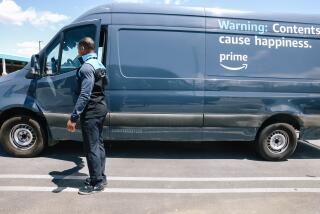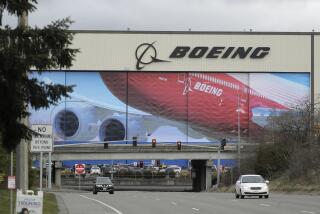UPS Strike Talks Showing Little Progress
The Teamsters and United Parcel Service continued marathon talks on Friday with scant signs of progress in settling the strike against the nation’s biggest package delivery service.
Pessimistic about any quick solution, the Teamsters called on locals around the country to “build strength on the picket lines and in the community.”
Teamsters President Ron Carey asked American workers to wear blue ribbons on the job Thursday to demonstrate solidarity with the 185,000 striking Teamsters.
The Teamsters’ tactics make it clear the union expects a prolonged dispute with UPS in the walkout of package sorters, loaders and delivery truck drivers that began Aug. 4.
The company made no statements Friday, although its top negotiators will keep meeting with Teamsters officials at the persistent urging of Labor Secretary Alexis M. Herman.
“It’s very clear they are redoubling their efforts,” said Susan King, special assistant to Herman. “They are really talking. They are very serious.”
Herman had arranged for talks between the company and the union, which had broken off last weekend, to resume Thursday morning.
The private discussions at the Hyatt Regency Hotel near Capitol Hill and a block away from Teamster headquarters ran until 2:30 Friday morning and resumed at 8 a.m., giving the weary participants a short break to sleep.
Carey emerged at 3 p.m. to report that “it’s obvious no agreements have been reached. I don’t have anything to report to our members in terms of progress.
“We didn’t ask for this fight, but we are going to win it.”
Company sources indicated there would be no comments while the informal talks are proceeding.
Meanwhile, the strike has become a factor as the Federal Reserve Board considers the direction of monetary policy. Fed officials on Friday asked UPS to supply estimates on the parcel carrier’s effect on the national economy, and the effect of the strike. The Fed’s policymaking Open Market Committee meets Tuesday to consider the direction of interest rates, and Fed officials will use the UPS numbers to craft estimates of what might have occurred had the strike not happened.
Union officials have been pleasantly surprised by several public opinion polls showing strong support for the union. In an era when union membership has declined to 14% of the work force, it is unusual to find sentiment in favor of a striking union.
Officials at the Teamsters and the AFL-CIO, which has promised loans from affiliated unions to help the Teamsters pay $10 million a week in strike benefits, believe the public is particularly sympathetic to part-time workers.
More than 50% of UPS workers are on part-time status. Many of them work four-hour shifts when there is a heavy volume of packages to be sorted and moved. The part-time workers earn $9 an hour, compared with $20 for full-time workers.
While the Teamsters are demanding that more workers be moved into full-time status, UPS management insists it needs flexibility to control costs and alter the size and activity of the work force in response to the demands of business.
The other major issue in the strike is a UPS proposal to withdraw from the current multi-employer pension program and create a new plan restricted to UPS workers. The company says this would provide a big boost in benefits for UPS retirees, with some workers with 30 years’ service getting their pensions increased from $750 a month now to $3,000 a month.
But the Teamsters are unalterably opposed to the plan because they say a UPS withdrawal would weaken the current system while allowing the company to save billions of dollars that would otherwise go to workers if the pension fund enjoys investment success in the stock market.
About 24,000 of the 185,000 striking Teamsters work in California. The union designated Thursday as “family day,” and there were barbecues and rallies in Stockton, Visalia, Martinez and Redding.
Carey sent a message Friday to locals declaring that “the way to win this fight for our UPS members and all American workers is to pursue a two-track strategy: trying to reach a settlement at the table while continuing to build strength on the picket lines and in the community.” Activities will include rallies and fund-raising events, culminating in an “Action Day for Good Jobs” on Thursday, Carey said.
The Teamsters president also said UPS workers in Belgium, the Netherlands, Germany and France are meeting to discuss ways to support the U.S. strikers.
UPS, which has controlled 80% of the parcel delivery services across the United States, usually ships about 12 million packages daily. The strike has slashed that volume to 10% of normal levels. The lost business is costing UPS $200 million to $300 million a week in lost revenue.
The U.S. Postal Service has picked up 15% to 20% of UPS business, and other private firms are also increasing volume. But it is not clear how much of the gap has been closed. Millions of packages are not being shipped, and many small businesses are laying off workers because they have been crippled in efforts to move their merchandise.
About 800 units of blood and blood components have been destroyed because of delays in shipments, the Associated Press reported.
More to Read
Inside the business of entertainment
The Wide Shot brings you news, analysis and insights on everything from streaming wars to production — and what it all means for the future.
You may occasionally receive promotional content from the Los Angeles Times.










